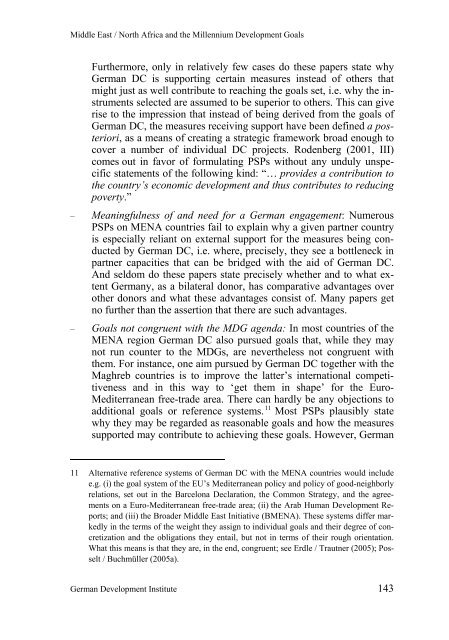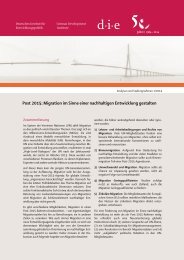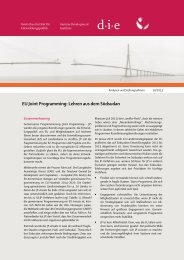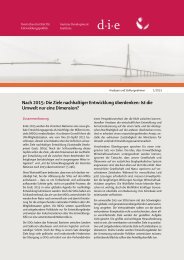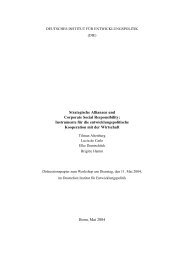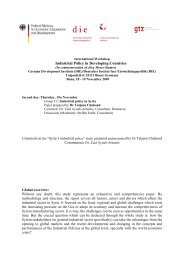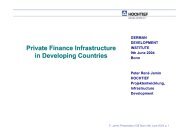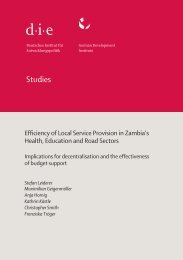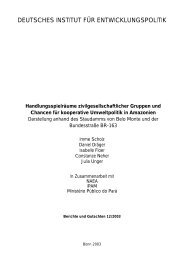Middle East / North Africa and the Millennium Development Goals ...
Middle East / North Africa and the Millennium Development Goals ...
Middle East / North Africa and the Millennium Development Goals ...
You also want an ePaper? Increase the reach of your titles
YUMPU automatically turns print PDFs into web optimized ePapers that Google loves.
<strong>Middle</strong> <strong>East</strong> / <strong>North</strong> <strong>Africa</strong> <strong>and</strong> <strong>the</strong> <strong>Millennium</strong> <strong>Development</strong> <strong>Goals</strong><br />
Fur<strong>the</strong>rmore, only in relatively few cases do <strong>the</strong>se papers state why<br />
German DC is supporting certain measures instead of o<strong>the</strong>rs that<br />
might just as well contribute to reaching <strong>the</strong> goals set, i.e. why <strong>the</strong> instruments<br />
selected are assumed to be superior to o<strong>the</strong>rs. This can give<br />
rise to <strong>the</strong> impression that instead of being derived from <strong>the</strong> goals of<br />
German DC, <strong>the</strong> measures receiving support have been defined a posteriori,<br />
as a means of creating a strategic framework broad enough to<br />
cover a number of individual DC projects. Rodenberg (2001, III)<br />
comes out in favor of formulating PSPs without any unduly unspecific<br />
statements of <strong>the</strong> following kind: “… provides a contribution to<br />
<strong>the</strong> country’s economic development <strong>and</strong> thus contributes to reducing<br />
poverty.”<br />
– Meaningfulness of <strong>and</strong> need for a German engagement: Numerous<br />
PSPs on MENA countries fail to explain why a given partner country<br />
is especially reliant on external support for <strong>the</strong> measures being conducted<br />
by German DC, i.e. where, precisely, <strong>the</strong>y see a bottleneck in<br />
partner capacities that can be bridged with <strong>the</strong> aid of German DC.<br />
And seldom do <strong>the</strong>se papers state precisely whe<strong>the</strong>r <strong>and</strong> to what extent<br />
Germany, as a bilateral donor, has comparative advantages over<br />
o<strong>the</strong>r donors <strong>and</strong> what <strong>the</strong>se advantages consist of. Many papers get<br />
no fur<strong>the</strong>r than <strong>the</strong> assertion that <strong>the</strong>re are such advantages.<br />
– <strong>Goals</strong> not congruent with <strong>the</strong> MDG agenda: In most countries of <strong>the</strong><br />
MENA region German DC also pursued goals that, while <strong>the</strong>y may<br />
not run counter to <strong>the</strong> MDGs, are never<strong>the</strong>less not congruent with<br />
<strong>the</strong>m. For instance, one aim pursued by German DC toge<strong>the</strong>r with <strong>the</strong><br />
Maghreb countries is to improve <strong>the</strong> latter’s international competitiveness<br />
<strong>and</strong> in this way to ‘get <strong>the</strong>m in shape’ for <strong>the</strong> Euro-<br />
Mediterranean free-trade area. There can hardly be any objections to<br />
additional goals or reference systems. 11 Most PSPs plausibly state<br />
why <strong>the</strong>y may be regarded as reasonable goals <strong>and</strong> how <strong>the</strong> measures<br />
supported may contribute to achieving <strong>the</strong>se goals. However, German<br />
11 Alternative reference systems of German DC with <strong>the</strong> MENA countries would include<br />
e.g. (i) <strong>the</strong> goal system of <strong>the</strong> EU’s Mediterranean policy <strong>and</strong> policy of good-neighborly<br />
relations, set out in <strong>the</strong> Barcelona Declaration, <strong>the</strong> Common Strategy, <strong>and</strong> <strong>the</strong> agreements<br />
on a Euro-Mediterranean free-trade area; (ii) <strong>the</strong> Arab Human <strong>Development</strong> Reports;<br />
<strong>and</strong> (iii) <strong>the</strong> Broader <strong>Middle</strong> <strong>East</strong> Initiative (BMENA). These systems differ markedly<br />
in <strong>the</strong> terms of <strong>the</strong> weight <strong>the</strong>y assign to individual goals <strong>and</strong> <strong>the</strong>ir degree of concretization<br />
<strong>and</strong> <strong>the</strong> obligations <strong>the</strong>y entail, but not in terms of <strong>the</strong>ir rough orientation.<br />
What this means is that <strong>the</strong>y are, in <strong>the</strong> end, congruent; see Erdle / Trautner (2005); Posselt<br />
/ Buchmüller (2005a).<br />
German <strong>Development</strong> Institute 143


